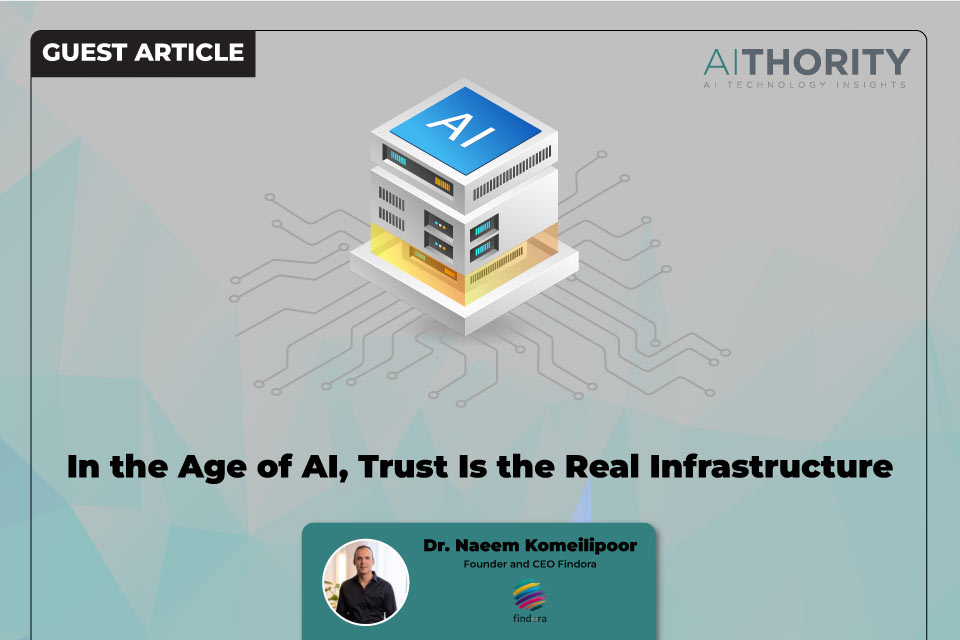Rewrite the
AI scientist, neuroscientist, inventor, and serial entrepreneur working to build ethical, human-aligned technologie
Artificial intelligence is now embedded in the systems that shape our daily lives. It supports legal decisions, guides medical advice, processes financial insights, and even influences what we read and believe. AI is no longer just a supportive tool. It is taking action, shaping outcomes, and operating behind the scenes in critical ways.
As this transformation accelerates, one vital ingredient is being left behind. That ingredient is trust.
Many AI systems produce content that looks polished and sounds convincing. But beneath the surface, the logic is often hidden. The sources are unclear. The assumptions are unknown. And the margin for error is wide.
Also Read: The Growing Role of AI in Identity-Based Attacks in 2024
The Cost of Context Loss
For most of modern history, information came with structure. Scientific papers cited sources. News stories quoted people. Professionals documented their reasoning. This context gave us a way to understand and verify what we were seeing.
AI-generated answers often lack this foundation. The output may sound accurate but give no indication of where it came from. In many cases, there is no way to trace the reasoning, validate the content, or challenge the conclusion.
This is especially dangerous in medicine, law, government, and finance, where accuracy is not optional. Context is not a luxury. It is a safeguard.
Explainability Before Fluency
AI systems today are trained to sound smooth and natural. They are optimized for fluency, not necessarily for truth. A system that delivers the wrong answer with confidence is more harmful than one that admits uncertainty.
The ability to explain is more important than the ability to impress. AI must be able to show how it arrived at a response. It should identify what data it used, what assumptions it made, and what sources it drew from.
Without this, even the most eloquent answer becomes a liability.
Professionals Need Systems They Can Trust
In high-stakes settings, AI is already being used to draft contracts, recommend treatments, summarize research, and flag risks. These are not theoretical applications. They are happening today.
But these tasks require more than speed. They require evidence. When an AI produces a summary or recommendation, professionals must be able to examine the underlying data and logic. Black-box systems cannot meet this standard.
In these environments, clarity is not a bonus. It is a requirement.
Why Local AI Matters
Most commercial AI runs on public cloud infrastructure, trained on vast internet data. These models may work for general tasks, but they are poorly suited to sensitive domains. A hospital or legal firm cannot afford to upload confidential information into a system it does not control.
Local AI offers a better alternative. It runs within trusted infrastructure, trained on internal documents and aligned with specific policies. It protects privacy, respects regulatory boundaries, and delivers more relevant answers.
Local AI is not just safer. It is smarter. It reflects the context, language, and priorities of the organization using it.
Governance Is the Foundation of Trust
For AI to be trusted, it must be accountable. Systems must log decisions, record inputs, and allow human oversight. There must be a way to track what influenced a result and who is responsible for reviewing it.
This is especially critical when AI is involved in hiring, insurance, public services, or legal decisions. Errors must be traceable. Bias must be detectable. Oversight must be possible.
Governance is not a feature to add later. It must be part of the core design.
Also Read: AiThority Interview with Nicole Janssen, Co-Founder and Co-CEO of AltaML
AI Agents Require Even Higher Standards
AI agents are now being developed to take action, not just answer questions. These systems schedule tasks, send messages, flag anomalies, and make decisions in real time. Some are supporting individuals in legal or healthcare environments. Others are assisting in finance, education, and accessibility.
Because they act on behalf of users, they require a higher level of safety and control.
AI agents must run in trusted environments. They must minimize data exposure. They must validate all outputs against reliable knowledge, not speculative patterns. They must log every action, allow user review, and be easy to shut down if anything goes wrong.
These agents are becoming part of digital infrastructure. And infrastructure must be built on trust, not assumption.
The Threat of Deepfakes
AI-generated media is introducing a new kind of uncertainty. With voice clones, fake images, and fabricated videos, people are struggling to know what is real. In some cases, the goal is deception. In others, it is confusion. Either way, the damage is real.
Institutions that depend on evidence are now vulnerable. If a video can be faked, how do we trust testimony? If a voice can be cloned, how do we authenticate communication?
The solution lies in verification. We need tools to authenticate digital content. That includes cryptographic signatures, metadata integrity, and transparent standards for labeling AI-generated material.
Without these safeguards, truth becomes negotiable.
Search Must Move Toward Transparency
Search engines once showed a list of sources. Today, AI systems often deliver a single, synthesized answer. This saves time but hides the process. Users are no longer invited to explore or verify. They are expected to accept.
This creates risk. A biased or incorrect summary can mislead without any clear path to correction.
Search must evolve. AI-powered search tools should cite their sources, explain their logic, and make uncertainty visible. Convenience must not come at the cost of clarity.
The Way Forward
Artificial intelligence is not going away. It will become more capable, more embedded, and more autonomous. But the future does not belong to the fastest systems. It belongs to the most trusted ones.
We need AI that respects privacy, operates transparently, and runs in secure environments. We need systems that are governed, explainable, and built for alignment with human values.
We do not need perfect answers. We need accountable systems. Intelligence alone is not enough.
Trust is the real infrastructure.
[To share your insights with us as part of editorial or sponsored content, please write to psen@itechseries.com]
in well organized HTML format with all tags properly closed. Create appropriate headings and subheadings to organize the content. Ensure the rewritten content is approximately 1500 words. Do not include the title and images. please do not add any introductory text in start and any Note in the end explaining about what you have done or how you done it .i am directly publishing the output as article so please only give me rewritten content. At the end of the content, include a “Conclusion” section and a well-formatted “FAQs” section.
“Ransomware, was ist das?”
Rewrite the width="5175" height="2910" sizes="(max-width: 5175px) 100vw, 5175px">Gefahr nicht erkannt, Gefahr nicht gebannt.Leremy – shutterstock.com KI-Anbieter Cohesity hat 1.000 Mitarbeitende...









